New Mental Health Coalition Forges Bonds
Ann Detrick, Reviled for Budget-Cutting, Embraced by Department's Clients
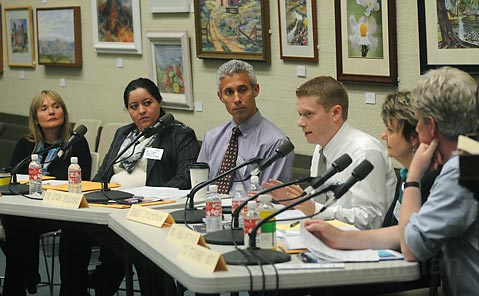
Considering the fur that might have flown, it was a surprise to see a December 3 forum attended by Ann Detrick, embattled head of the Santa Barbara County Department of Alcohol, Drug, and Mental Health Services (ADMHS) – and organized by people dependent on the mental health division – turn into a love fest. When she took the reins of the ADMHS last year, Detrick’s first task was to identify millions of dollars in cuts to mental health programs. This did not make her popular
In case the seriousness of the department’s unhappy fiscal situation – mostly due to declining state revenues – was lost on the crowd, moderator and Trinity Episcopal Church rector Mark Asman began by asking the audience of more than 100 people to “please be respectful” of those in attendance whose behavior might be unusual due to the fact that their services were reduced or cut off.
Nonetheless, the mood was upbeat as participants celebrated the five-month anniversary of the Consumer Advocacy Coalition (CAC), founded by Roger Thompson in July to lead a charge against the cuts. These efforts were largely unsuccessful, but his organization has since grown in influence. “Consumers have been left out of the process of deciding how their services should look,” Thompson declared in his opening remarks, “and that should end.”
The CAC has built on the foundation laid by two other Santa Barbara consumer groups, Prop. 63 for Me and MHSA Our Way, which have attempted to help guide the enactment of the Mental Health Services Act of 2004. To an unprecedented degree, these two groups made Santa Barbara consumers part of the dialogue about mental health services. On the night of the forum, the presidents of those two organizations – Ann Google of Prop. 63 for Me, and Chuck Hughes of MHSA Our Way – were at the forum selling CAC buttons, symbolizing their support and inclusion in the new group. The main difference between the organizations is that CAC, while also consumer led, includes families and service providers as well. It is hoped that this will give it more firepower.
Asman asked each of the seven panelists to describe their vision for mental health services.
Silvia Perez, a peer recovery specialist for Project Hope in Santa Maria, and one of three clients hired as a service provider in the wake of Prop. 63, emphasized the value of clients helping other clients. “I see more of us working with more clients,” she said. “Being with clients in crisis, just talking to them. Sometimes in crisis we can’t speak; it’s important just to be there.”
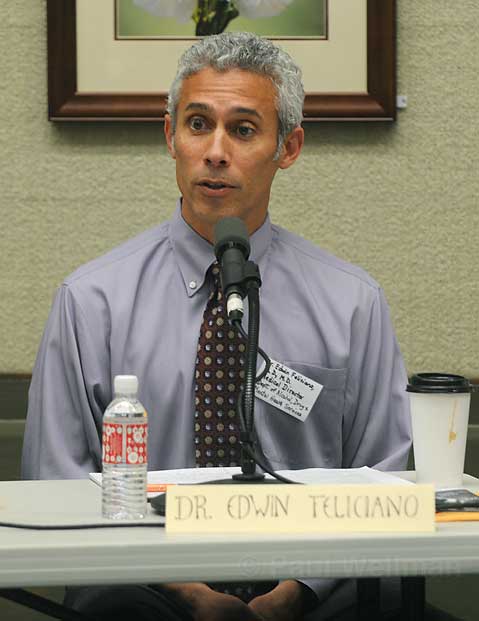
Along similar lines, a Dr. Edwin Feliciano, medical director for the county’s Department of Alcohol, Drug, and Mental Health Services, said successful therapy depends on having time to listen to clients.
Suzanne Riordan, whose bipolar son died three years ago of a heroin overdose, and who anecdotally cited more recent overdoses and suicides, was the lone voice of warning: Describing her vision of mental health services five years from now, she said, “I see a community increasingly ravaged by despair.” She talked about the 300 drug-or alcohol-addicted mentally ill who were reclassified as substance abusers only as a cost-saving measure, and who as a result “suddenly became the prey of the justice system.” Riordan mentioned the “gaping hole in services: residential treatment beds for those in acute crisis,” and asked audience members to call Cottage Hospital President Ron Werft demanding that he admit adolescents, Medi-Cal recipients, and involuntary commitments to the psychiatric ward.
When Perez suggested that Werft instead be invited to join CAC, Riordan agreed, saying, “That’s the best way to go.” Turner added that Mike Brown, Santa Barbara County’s chief executive, should also be invited. Riordan ended on a hopeful note. “But given that we are a loving, creative, and responsive community, we are aware that public safety does not equal prison,” she said. “Even if we have no money, being there for each other has turned out to be a huge, huge part of the solution.”
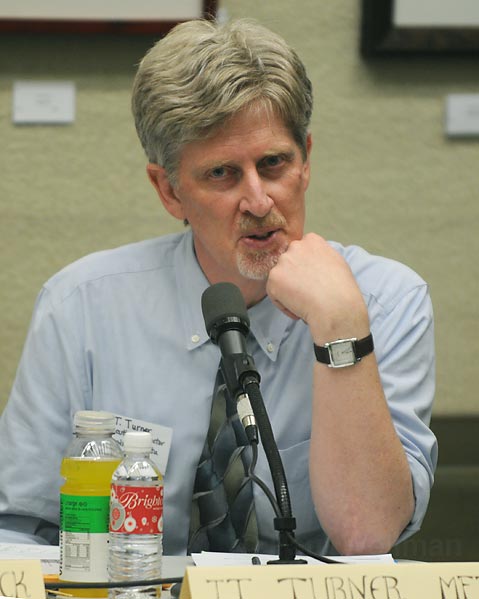
J.T. Turner, executive director of the nonprofit Phoenix House residence, talked about the loss of the outpatient program there during the budget cuts, saying, “It wasn’t a program, it was a community that stopped functioning. I think the best work happens when we focus on community,” he said. “When you have good community, your mental health sort of follows from that.” Turner tapped into the general sentiment when he called for the continuation of meetings such as this forum. “We need consumers, family, contractors, and administrators all working together like this,” he said, calling for an “ongoing planning council with members from each of these constituencies.”
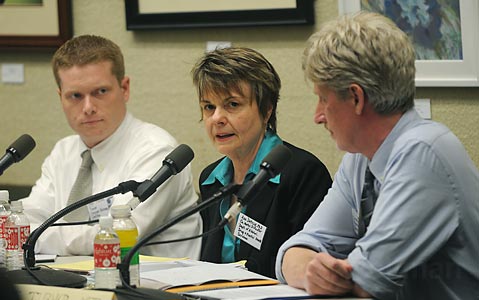
Sandwiched between Turner, who had been baldly critical of her during the budget process, and Thompson, who made a point of congratulating her on the services he was currently receiving, even though he lost the services he had previously been receiving, Detrick said she had some “nice planning meetings with CAC.” She said that her department has a database of the 300 to 350 people whose services were changed or lost due to budget cuts, and is tracking what’s happening with them. She conceded support for an individual’s input into what his or her care should be: “If the individual and the staff helping them don’t agree,” she said, “that should be worked out.” Responding to an audience member’s nightmarish account of a friend in jail who was unable to get his psychiatric medications for six days, she said that ADMHS does collaborate with the jail but said she would “see if we can do more.”
The message she had brought with her to deliver was, “Nobody is untouched by mental illness,” as she spoke about the importance of early detection and of educating the community – from family members to bus drivers, landlords, police, teachers, college professors, and employers – in the nature of mental illnesses and how to be supportive.
Thompson spoke about the importance of educating voters to elect officials aware of the link between mental illness and such social ills such as drug abuse and homelessness.
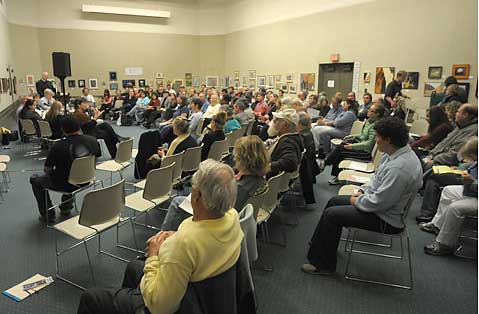
The meeting ended with the conferring of a $3,000 grant from the Fund for Santa Barbara, and a standing ovation for Thompson, lauded by CAC member Leah Juniper for organizing in the face of daunting setbacks. “When cuts happened, he could have fallen apart, but instead he said, ‘What shall we call ourselves?'”



